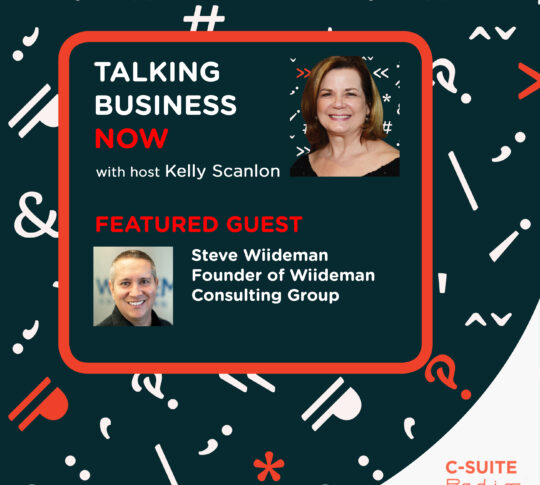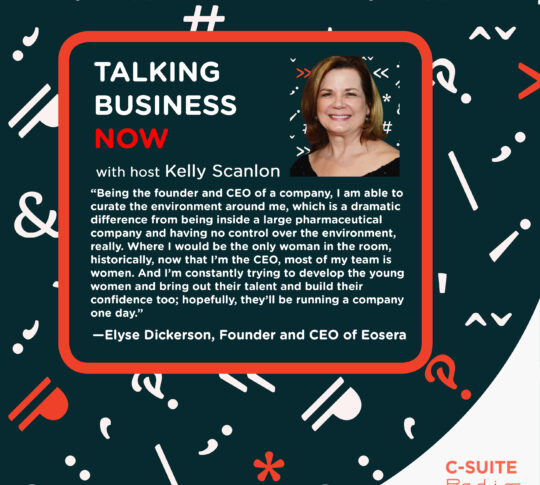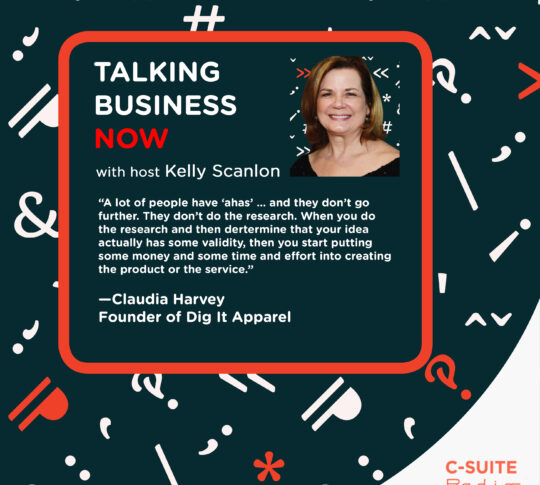
Listen to the podcast episode here, or read the transcript below for “Technology Solutions Spins Off New EdTech Company,” with guest Josh Christopherson, founder of iCUE Technology and Achieve Today.
Kelly Scanlon
Welcome to Talking Business Now. I’m your host, Kelly Scanlon. Thank you for joining us. We’re Talking Business Now with Josh Kristofferson, the CEO, and co-founder of iCUE Technology and the CEO of Achieve Today.
In this episode of Talking Business Now, Josh talks with us about how owners and managers can grow their businesses using cloud-based employee education systems. Welcome, Josh.
Josh Christopherson
Thanks, Kelly, I appreciate you having me on today.
Kelly Scanlon
Walk us through what you do and how the two companies—iCUE Technology and Achieve Today—really work hand in hand with each other.
Josh Christopherson
My business partner and I started Achieve Today about seven years ago, and it came from a background in the education space. We’d worked with a lot of students and individuals in a one-on-one type setting and distance learning, a little over 100,000 students in a little over 70 countries, I think.
And during that time, we found that some of the main core principles that made people successful was their underlying habits, their limiting beliefs, their thought patterns, whether positive or negative. And we found that if we focused on training in those areas, it could make them successful any area of life. And that’s where Achieve Today essentially started.
To your take your question a little bit further, over the last six or seven years through Achieve Today, we started to find a need to integrate technology into the learning system that we use. A lot of our education was done one on one over the phone, you know, obviously on the computer, email messaging that way, but technology wasn’t really a big part of it over those years.
And we were able to really move the needle for people during those sessions that they would have on a weekly basis. But we needed to bring technology into it to fill in the gaps. So we started building a software to develop that. That is where IQ technology was born. We created an online learning system, or a platform, that now has AI technology built into it, and many different tools to move a student forward in their educational journey that they go through in many different areas. Through the pandemic, it has definitely accelerated things for us with many different businesses coming on board.
Kelly Scanlon
There are a lot of different learning platforms that are dedicated to employee training, to helping students learn online, outside of the classroom. How is yours different?
Josh Christopherson
There are so many out there. And that’s something we learned. When we got into it, remember, we were just trying to solve problems for Achieve Today—for that company.
Kelly Scanlon
Right? You weren’t technologists.
Josh Christopherson
No, no, we weren’t. We weren’t going out to disrupt that market, or create, you know, something that was better than all those other content delivery systems or LMS systems. We were just, like I said, going to solve problems that we faced. So we essentially went into that a little bit blindly.
And now I’ve seen there’s so many different tools that are out there that people are using to be able to deliver that content. Ours is designed to essentially reach out and engage the individual.
With so many different tools, you can get in and have the best content in the world out there. But once someone gets in and starts using it, they start to lose interest. Or maybe those habits don’t continue to get in and consistently use those different software or those tools or those learning platforms. And we created the AI, as you’ve mentioned, to reach out and engage individuals and bring them back in and suggest things based on how they’re feeling or struggles that they’re having in their life, whether it’s on the job, or at home, different challenges that they may be facing at work. And that allows us to engage with someone on such a different level than even a manager could.
Kelly Scanlon
Give me an example of how you might do that kind of outreach, that kind of engagement.
Josh Christopherson
We found that push notifications through native apps and different tools of that matter or emails, for example, they don’t engage people at the same level that we can through text. I think everybody knows when they get a text, you could be sitting in a meeting, and you’re going to look at your phone. You’re going to read that text. Its deliverability is through the roof.
What we did was we taught our AI as it started to learn the individual, it essentially will text the student and message them at the cadence that the business wants, you know, whether it’s daily or monthly or weekly, for example, to check in on them and see how they’re doing.
It may reach out—I can give you an example of an experience that I used as a demo the other day. We had an employee that was struggling with an argument they had on the job with a co-worker, and AI essentially texted them that morning and said “Hey, we noticed you hadn’t logged into the platform in the last week. Wanted to check in and see how you’re feeling today.”
And the employee texted back and said, “You know, I’m feeling a little stressed. I’m worried. I had an argument with a co-worker this morning. And it’s, it’s got me worried.”
And our AI coach essentially texted her back and said, “You know, arguments are no fun. They can cause stress on the job and cause challenges. I can understand how you’re feeling. Here’s a short little video clip, to help you to know what next steps to take to move past that and clear things up with the employee, and move forward with that challenge.”
And what they’re able to do then is without even logging into the platform, initially, it’s almost like communicating with a person or a coach.
Kelly Scanlon
And they, like you said, they don’t have to log back in. They can just click that link that’s right there in their text, and you’ve set up the AI, it sounds like, basically to be an accountability partner, in addition to a content resource.
Josh Christopherson
It absolutely is. And that’s how we, we essentially designed it. Remember, we came from that education and coaching space over the last, you know, 10 to 20 years, and we knew that the value of a coach and that accountability partner, for example, it really moves the needle. And the thing that we found to be valuable over many years with learning is you need that personal touch, that person to guide you through it. But if you can bring technology in, an AI tool, for example, to help fill in those gaps in the middle, and act as that partner, but then connect you with a mentor or a real person when you need it to escalate things and take it to the next level, you can really transform lives on so many levels.
Kelly Scanlon
What kinds of content do you offer?
Josh Christopherson
Achieve Today’s clients is more the business-to-consumer space. So, it’s the individual. It’s someone like you or me that’s looking for help and doesn’t know where to turn but wants kind of a learning path to help improve in life. And that could be your career, your relationships, your finances, parenting, for example. So there’s a lot of content in many of those areas.
Now, iCUE Technology, however, our technology business that has really taken off in the business-to-business space. Essentially, those are our customers or more businesses or companies that are looking to improve their employees to help increase retention. For example, improve happiness on the job, help train and move people down specific learning paths.
So that could be a company who’s looking to do a better job with onboarding, but then engage people or their employees and move them down specific learning paths rather than just say you need to take this onboarding training on dealing with conflict or conflict resolution. With us, we’ll take them through a series of courses that the company wants their own content, for example, but then we give them access to close to 400 different courses in areas outside of work, like dealing with relationships, or we have sales and persuasion courses to help sales employees, we have management courses and training to help with management and growth there.
And again, like I said, there’s other things, you know, with people who are struggling with mindset or anxiety, or some of those challenges that we’ve seen with some businesses over the last year that we’ve been helping to move the needle on that they couldn’t address before, or didn’t have the capability.
Kelly Scanlon
Many times performance on the job is impacted by what’s going on in a person’s personal life.
Josh Christopherson
Yeah, companies are learning or have been learning for the last at least few years, how important it is that they can’t just bring in bring in food trucks or start up a cafeteria or do these different incentives—give out gym memberships, for example, to make people happy on the job.
It needs to be learning and training and developing to help them outside of work as well. And really bringing the two together—your home life and your work life—and making them coexist and work together really well. So many managers don’t have the capability or know-how to deal with some of these challenges that employees face. A lot of times it’s taboo for an employee to go to their manager and say, “Man, I’m dealing with troubles at home” or especially with the virus, for example, we had people who were working from home and didn’t want to tell their manager that they’re struggling to get on a Zoom meeting because they’re trying to take care of their children or a sick parent who’s at home that they’re trying to care for in the background as well.
And they don’t want to talk about that and have those things with work come together because they could be judged and a manager say this person isn’t, you know, I’m not going to promote them or I can’t have them take on this important project because of those things.
Kelly Scanlon
I have talked to so many founders over the years who have developed something to help their own situation within their own company thinking that it’s just going to be a process that exists within their current business, but then they have such success with it and realize, “Hey, I could spin this off and create another company”—just like you did. And you are non technologists.
Talk to us about when you own a company and you create a solution to a problem that you’re experiencing within that existing company. What are some tips that you can offer for spinning that out? And, specifically, if it’s in an area where you don’t necessarily have a great deal of expertise, you know what you want, but you don’t really know how to develop it yourself. And now you’ve got another company that’s actually doing it. Talk to us about that whole process.
Josh Christopherson
You know, it’s really fun. Because when you have a company that’s successful in one space, and that’s transforming lives, and you’re trying to find a way to do a better job of it, and adapt and grow with, you know, with technology, for example, find ways to do better using those tools, you don’t really set out to, like we talked about, and even as you asked, you don’t really set out to go build a technology company.
I know I hadn’t managed teams of developers before, and didn’t really know much about that. But really, the key is finding—you hear it so many times, it’s almost hard to say because it’s finding those needs. And when you have a business that’s going in one direction, and you’re trying to solve problems, especially when you’ve done it for a long time in the education space like we had, you’re able to really notice the things that make people successful in life. And if you’re transforming lives, you can really get passionate about it. And so I would suggest you find your passions. And then you find the ways to really move the needle in those areas. What are things that people are missing? What are they lacking? What could improve that for the world?
Our vision as a company is a world without limits. And you know, what could we do if we could create a world with no limits and remove those limits that people have in their minds, those blocks, whether it is on the job or at home or with parenting, for example. It really opens up your mind and helps you think of things a little bit differently and solve problems a little differently. And then you start to uncover those little steps, those little things that can make the difference.
For us, it was finding a little bit better way to transform individuals’ lives. And as we got into that technology piece and started building out a software and started this new company iCUE Technology, then you start to learn how to do it and you take the knowledge that you already have, that made one of the other things that you did successful, and you move that over, but find new and better ways to solve it. And that’s what we did with iCUE Technology. And we were able to blend the personal development piece with AI technology and an online learning platform. So it’s been a lot of fun.
Kelly Scanlon
A real important takeaway there is don’t attempt to do it yourself, you may have the idea. And you may have the passion, but then also know your strengths and your weaknesses, and hire the people or outsource to the folks who do know what they’re doing in order to get that off the ground.
Josh Christopherson
And like I said, it’s been a learning process over the years, but I had to build a development team and you have to learn that process. Like you said, you have to bring the people in, the smart people, that know how to do that. And then you take your vision, and they help you build it, and they help you grow it. And it’s been something that’s been fun and a very educational journey.
Kelly Scanlon
One of the things that you suggest that business owners be Talking Business Now about in 2021 is the role of technology in the future of education. I think a lot of times when we talk about or think about the future of technology and education, we think about the classrooms. We think about grade school students, middle school students, high school, college, but education is a lifelong process. So talk to us about the role of technology in that future.
Josh Christopherson
The role of education is to help someone grow. And like you said, it may not just be, you know, to go get a job. It could be to help grow and do better in your current career. Because for me, when I needed to learn new things, I was going out and seeking out that education to learn and grow as well. And it may not be to get a degree. It may not be to make more money. It may not be because your employer says you have to do it. It may be because you want to be better in many different things.
And I think the future—we’re starting to see people reach out for that a lot more, you know, when they face challenges at home. Like I said it could be parenting, it could be relationships, it could be your finances or your job, doing better on your job. If we’re able to deliver that to someone who’s at home, they don’t have to physically go to a location, but then connect to them. A lot of people have been using Zoom. And Zoom has been a huge tool that’s helped us through this last year with the pandemic.
But if you can combine the learning tools, the courses and training that you go through with a mentor with a coach or a trainer, for example, or your manager, and bring those two together, and then fill in the gaps in between with an AI tool that can help to connect you and move you forward and keep you engaged, then that’s where you really start to see those transformations in your life. And so technology needs to be able to integrate in and allow you to experience life the way that you would want to anyway, and move forward. But then still insert those educational tools to help you grow, almost as if, so that you don’t feel it. So it doesn’t feel invasive, and just be a part of your life and help you continually be progressing and growing and being a better person.
Kelly Scanlon
So it sounds like what you’re saying is that we just need to think more broadly about education, about what it is and what it can do. I know you’re not a technologist, but from where you sit, what do you see as some of the trends, and I’m not talking here necessarily about thinking more broadly about education and its applications. I’m talking specifically now about technology itself. AI is unleashing so many more possibilities. Do you see any other trends or any new kinds of innovations that are going to take technology even further? And if so, what are they and how are we going to be able to apply them to our businesses, for educational purposes?
Josh Christopherson
I think it’s really important that businesses and individuals as we move forward embrace—a lot of the conversation that’s going on right now is around privacy, and security, and all of that. And so I think as you move through education, and as we as businesses, embrace it to help move people forward, I think it’s important that we’re all aware that things need to be kept private and secure, and help move people forward in a safe way. And so that’s a conversation I’m seeing happening a lot.
It’s very easy to adopt technology. And it’s fun, and it’s exciting to see what it can do. But at what cost? And so I think it’s important to keep that conversation open. So that’s one thing that I’m noticing, and that I’m seeing. The other things that are exciting, is using the AI and the technology to really—I mentioned before—integrate into our lives more.
So there’s some you know, there’s obviously the Oculus and some of these VR tools. I’ve noticed over the last year in the education space or more of the event space, there are a lot of people that we work closely with as a company that are starting to use or transform their events differently. And now it’s becoming something where you can actually almost feel like you’re physically there while you’re sitting at home, in your living room or in your kitchen. And that technology is delivered in a way—I mean there’s conversations about virtual eyeglasses and different things that are hopefully upcoming soon. And being able to integrate into those things.
And like I mentioned before, learn and grow without it interrupting your daily life. You still need to, you know, go to work, for example. You still need to come home and have a life at home and disconnect from the job. But then also have a personal life as well and be happy there. And I think that it’s so important to see these different things that are coming. We have these Apple Watches now on our wrist. They’re tapping us and telling us to stand up or to walk around the block or drink more water, for example. And what it’s done is it’s allowed us to improve ourselves without being too invasive, and just kind of give us little taps and notifications and reminders to help us keep our mind on the things that are important to grow in our lives.
Kelly Scanlon
So many people got to the point where technology took over their lives. It had flipped from being something that facilitated their jobs and their lives. And instead it became like this big anchor. It was just constant—you couldn’t get away from it. They’re glued to their iPhones, you hear kids, you know, glued to their tablets and so forth. But it sounds like because of what people are demanding and businesses are demanding that it’s forcing developers to consider how to make it less intrusive, still benefits of it, but not feel like it’s taking over your life.
Josh Christopherson
You have to, like I mentioned before, there’s new apps. I mean, they talk about calming and meditation and things. Well, you know, there’s new apps popping up every day to do that. And the problem is, you download more and more on your phone. It’s keeping you sucked into your phone more than notifications there. It’s all these things that just keep building up and it’s so important that we find ways to really blend the two, the two worlds together a little bit better. And not be so attached to only technology. It’s important to never lose sight of that human connection.
Kelly Scanlon
Josh, if someone wanted to learn more about iCUE or Achieve Today, how would they get in touch with you?
Josh Christopherson
Yeah, if it’s an individual, we have a website called AwakenTheGreatness.com. And they can learn more about the software there. But yes, our website AchieveToday.com for the personal development space or iCUE.tech, that’s where businesses can learn more about the software to help move their business forward.
Kelly Scanlon
Okay, so all three of those websites will be in the show notes as well.
Josh, thank you so much for being our guest today, for sharing your entrepreneurial journey, as well as the ways that we can use technology to enhance education in so many different ways.
Josh Christopherson
Yeah. Thanks, Kelly. This has been fun, appreciate it.
Kelly Scanlon
And I’m your host, Kelly Scanlon. Thanks for joining us on this episode of Talking Business Now. Be sure to tune in next week when we talk with Steve Wiideman, founder of Wiideman Consulting Group about Voice Search trends and SEO. And don’t forget to visit TalkingBusinessNow.com to subscribe to the podcast and to sign up for our weekly newsletter that offers more insights into our guests, and the topics business leaders should be Talking Business Now about in 2021.



